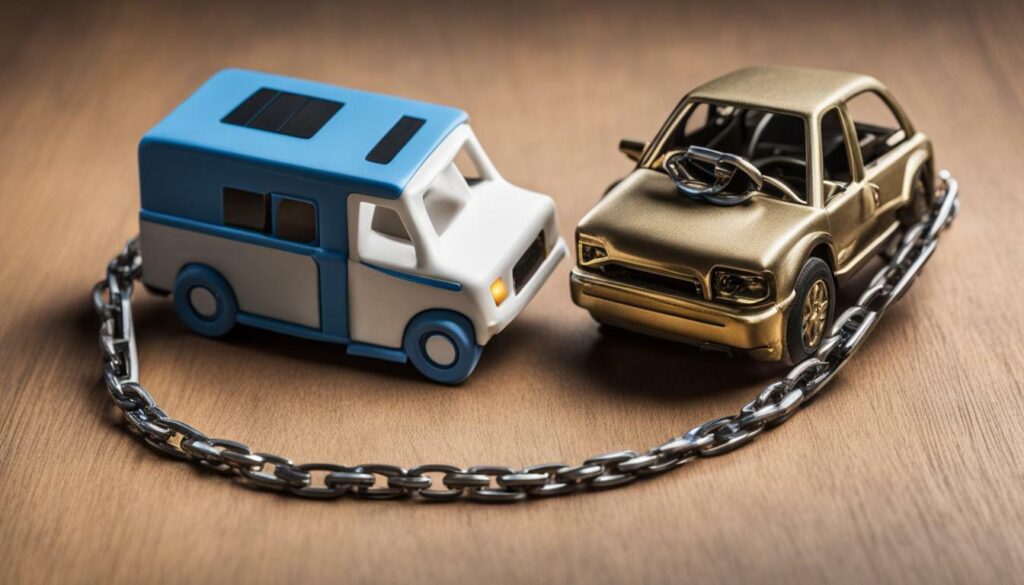Successfully Navigating Credit After a Major Life Change

Navigating credit after a major life change can be challenging, but with the right strategies, you can successfully rebuild your credit and achieve financial stability. Whether you have gone through a divorce, bankruptcy, job loss, illness, relocation, or marriage, understanding the impact of these life changes on your credit is crucial.
Key Takeaways:
- Resolve joint debts and close joint accounts after a divorce to protect your credit.
- Regularly monitor your credit report and score to stay informed about your debts and identify any errors.
- Make on-time monthly payments to improve your credit score and maintain financial stability.
- Establish your own credit history after a major life change, such as bankruptcy, job loss, illness, relocation, or marriage.
- Keep your credit utilization low, as it is the second-most important factor in determining your credit score.
Understanding the Impact of Major Life Changes on Credit
Major life changes such as divorce, bankruptcy, job loss, illness, relocation, and marriage can have a significant impact on your credit, but understanding how these changes affect your credit is the first step towards successfully navigating credit after a major life change. Rebuilding credit after a major life change requires taking certain steps to regain financial stability and improve your credit score.
When going through a divorce, it’s crucial to resolve joint debts with your ex-spouse and close any joint accounts. This ensures that you are no longer financially tied to your ex-partner and protects your credit from any future liabilities.
Monitoring your credit report and score on a regular basis is essential after a major life change. It helps you stay informed about your debts, identify any errors or fraudulent activity, and take appropriate steps to address them. You can obtain a free copy of your credit report from each of the three major credit bureaus annually.
🚨 TUIC Errors + Low Credit Score?
CreditScoreIQ helps you build credit faster by reporting utility bills to all 3 bureaus—while you dispute errors.
Start Building Credit Today →
| Life Change | Steps to Take |
|---|---|
| Divorce | Resolve joint debts and close joint accounts. |
| Bankruptcy | Work with a bankruptcy attorney to navigate the process and rebuild credit. |
| Job Loss | Create a budget, reduce expenses, and explore new employment opportunities. |
| Illness | Communicate with medical providers to manage medical bills and consider medical debt consolidation options. |
| Relocation | Update your address with creditors, establish new financial accounts, and manage your debts effectively. |
| Marriage | Discuss financial goals and responsibilities with your partner, and consider merging or maintaining separate finances. |
Making on-time monthly payments is a crucial factor in improving your credit score. Ensure that you continue to pay all your bills on time to demonstrate responsible financial behavior and rebuild your credit over time.
Establishing your own credit history is important after a major life change. Opening a credit card or loan in your name can help you build a positive credit history and prove your creditworthiness to lenders.
Additionally, keeping your credit utilization low is essential for improving your credit score. Aim to use only a small percentage of your available credit to show that you can manage your debts responsibly.
Key Takeaways:
- Divorce, bankruptcy, job loss, illness, relocation, and marriage can all impact your credit.
- Resolving joint debts and closing joint accounts is important after a divorce.
- Monitoring your credit report helps you stay informed and address any errors.
- Making on-time monthly payments demonstrates responsible financial behavior.
- Establishing your own credit history and keeping credit utilization low are both crucial for rebuilding credit.
Resolving Joint Debts and Closing Joint Accounts
After a divorce, it’s important to address joint debts and close any joint accounts to protect your credit and financial stability. Joint debts, such as mortgages, loans, or credit card accounts, can continue to impact your credit even after the divorce is finalized. Failing to resolve these debts can lead to missed payments or defaults, which can significantly damage your credit score.
To start, make a list of all joint debts and review the terms and conditions for each. Determine who is responsible for each debt and whether it can be refinanced solely in your name. If refinancing is not an option, consider selling any joint assets to pay off the debts. Communicate with your ex-spouse to come to an agreement on how to handle the debts and ensure timely payments.

In addition to addressing joint debts, it’s crucial to close any joint accounts. Joint accounts can still be accessed and utilized by both parties, which can lead to potential financial complications. Contact each financial institution where you have joint accounts and request to close them or remove your name from the account. Ensure that all joint accounts are paid off and that you receive confirmation of the account closures in writing.
By resolving joint debts and closing joint accounts, you can protect your credit and financial well-being after a divorce. Taking proactive steps to address these matters will help you rebuild your credit and move forward with financial independence.
Monitoring Your Credit Report and Score
Monitoring your credit report and score is crucial after a major life change, as it allows you to stay informed about your debts and identify any inaccuracies that may be impacting your credit standing. When you’re going through a divorce, job loss, bankruptcy, or any other significant life change, it’s important to keep a close eye on your financial health.
One way to monitor your credit is by regularly checking your credit report. Your credit report provides a comprehensive overview of your credit history, including your payment history, credit utilization, and any negative marks such as late payments or collections. By reviewing your credit report, you can ensure that all the information is accurate and up to date.
In addition to reviewing your credit report, it’s also important to monitor your credit score. Your credit score is a three-digit number that lenders use to assess your creditworthiness. It takes into account factors such as your payment history, credit utilization, length of credit history, and types of credit accounts. By keeping track of your credit score, you can get a sense of how your financial decisions are impacting your creditworthiness.
| Why should you monitor your credit report and score? | How can you monitor your credit report and score? |
|---|---|
| To stay informed about your debts | Request a free copy of your credit report annually from each of the three major credit bureaus: Experian, Equifax, and TransUnion. You can also sign up for credit monitoring services that provide regular updates on your credit report and score. |
| To identify any inaccuracies | Closely review your credit report for any errors or inaccuracies. If you find any, dispute them with the respective credit bureau to have them corrected. |
| To track your creditworthiness | Regularly check your credit score to see how you’re faring. There are many free credit score monitoring services available that allow you to keep tabs on your score. |

By actively monitoring your credit report and score, you can take control of your financial situation and ensure that your credit remains healthy. This knowledge empowers you to address any issues promptly and make informed decisions to improve your credit management and overall financial well-being.
Making On-Time Monthly Payments
Making on-time monthly payments is vital for improving your credit score and ensuring financial stability after a major life change. Late or missed payments can have a significant negative impact on your credit, making it harder to qualify for loans, credit cards, and favorable interest rates. To avoid these pitfalls, it’s crucial to stay organized and prioritize your bill payments.
One effective way to stay on top of your payments is by setting up automatic payments. Most banks and credit card companies offer this service, allowing you to schedule payments on specific dates each month. This ensures that your bills are paid on time without any effort on your part. Just be sure to have enough funds in your account to cover the payments.
Another strategy is to create a monthly budget that accounts for all your expenses, including debt repayments. By allocating a specific amount of money towards your bills each month, you can avoid falling behind and establish a routine of timely payments. You can use budgeting apps or spreadsheets to track your income and expenses and make adjustments as needed.
Remember, each on-time payment contributes to rebuilding your credit and demonstrates responsible financial behavior. Over time, your payment history will reflect positively on your credit report, leading to a higher credit score and improved financial opportunities.
Benefits of Making On-Time Monthly Payments
• Boosts your credit score: On-time payments demonstrate financial responsibility and improve your creditworthiness, making it easier to obtain credit in the future.
• Avoids late payment fees: Timely payments save you the hassle of dealing with late fees and penalties, which can quickly add up and strain your finances.
• Builds trust with lenders: Consistently paying your bills on time establishes trust with lenders, increasing your chances of getting approved for loans and lower interest rates.

Establishing Your Own Credit History
To rebuild your credit after a major life change, such as a bankruptcy, job loss, illness, relocation, or marriage, it’s important to establish your own credit history by opening a credit card or loan in your name. This will allow you to demonstrate your ability to manage credit responsibly and build a positive credit score.
When choosing a credit card or loan, consider options that are tailored to individuals with limited or damaged credit. Look for credit cards that offer low credit limits and reasonable interest rates, or secured credit cards that require a refundable security deposit. These types of credit cards can be a great starting point for rebuilding your credit.
| Credit Card/Loan Options | Features |
|---|---|
| Secured Credit Cards | Requires a refundable security deposit as collateral; helps build credit with responsible use. |
| Store Credit Cards | Generally easier to qualify for; limited use at specific retailers; may have higher interest rates. |
| Subprime Credit Cards | Designed for individuals with damaged or limited credit; may have higher fees and interest rates. |
| Credit-Builder Loans | Secured loans that help establish credit history when repaid on time; funds typically held in a CD or savings account. |
When using your new credit card or loan, it’s crucial to make all payments on time and keep your credit utilization low. Maintaining a low credit utilization ratio helps demonstrate responsible credit management and can positively impact your credit score.
Remember, rebuilding credit takes time and patience. By establishing your own credit history and using credit responsibly, you can gradually improve your credit score and regain financial stability.

Keeping your credit utilization low is crucial for improving your credit score and maintaining a healthy credit standing after a major life change. Credit utilization refers to the percentage of your available credit that you are currently using. It is the second-most important factor in determining your credit score, after making on-time monthly payments.
To keep your credit utilization low, start by paying down your existing balances. Focus on high-interest debts first, such as credit card balances, and aim to pay them off as quickly as possible. Consider using balance transfer credit cards to consolidate your debts and lower your overall interest expenses.
Another way to lower your credit utilization is to request a credit limit increase on your existing credit cards. This can help increase your available credit and lower your utilization ratio. However, be cautious not to increase your spending habits with a higher credit limit – the goal is to decrease your overall debt, not accumulate more.

Monitoring your credit utilization regularly is essential. Aim to keep your utilization ratio below 30% to maintain a healthy credit score. You can track your credit utilization by reviewing your credit card statements or using online credit monitoring tools.
Summary:
- Pay down high-interest debts and prioritize credit card balances.
- Consider balance transfer credit cards to consolidate debt and lower interest expenses.
- Request a credit limit increase to increase your available credit and lower your utilization ratio.
- Monitor your credit utilization regularly and aim to keep it below 30%.
Seeking Help from Credit Repair Companies
If you’re struggling to navigate credit after a major life change, consider seeking help from reputable credit repair companies who can provide expert guidance. These companies specialize in assisting individuals who are dealing with challenges, such as bankruptcy or divorce, by offering personalized solutions to help improve their credit scores and rebuild their financial standing.
One reputable credit repair company worth considering is Credit Saint. They have a proven track record of helping clients with various credit issues, including bankruptcy and divorce. Their team of experts works closely with clients to develop customized strategies to address their unique credit challenges. With Credit Saint’s assistance, you can take proactive steps to improve your credit and achieve your financial goals.

Another reputable credit repair company to consider is Lexington Law. They have extensive experience in assisting individuals who have undergone major life changes and need help rebuilding their credit. Lexington Law offers a range of services, including credit report analysis, credit score improvement strategies, and assistance with disputing inaccurate information on your credit report. Their team of professionals can guide you through the credit repair process and provide the expertise you need to regain control of your financial future.
When choosing a credit repair company, it’s essential to do your research and select a reputable and trustworthy provider. Look for companies with a strong reputation and positive customer reviews. Additionally, consider working with a company that offers personalized support and a tailored approach to your specific credit situation.
| Credit Repair Company | Specialties | Benefits |
|---|---|---|
| Credit Saint | Bankruptcy and divorce | Personalized strategies and expert guidance |
| Lexington Law | Credit report analysis and dispute assistance | Experienced team and comprehensive services |
By seeking help from reputable credit repair companies, you can gain the support and guidance you need to navigate credit successfully after a major life change. Remember, rebuilding your credit takes time and effort, but with the right assistance, you can regain financial stability and secure a brighter future.
Conclusion
Successfully navigating credit after a major life change requires careful planning, proactive steps, and a commitment to rebuilding your credit and maintaining financial stability. Whether you’ve gone through a divorce, experienced bankruptcy, job loss, illness, relocation, or marriage, there are specific actions you can take to regain control of your credit.
First and foremost, it’s essential to resolve joint debts with your ex-spouse and close any joint accounts. This will help protect your credit score and prevent any further financial entanglements. Additionally, monitoring your credit report and score is crucial in understanding your debts and identifying any errors that may be impacting your credit negatively.
Making on-time monthly payments is a key factor in improving your credit score. It’s important to continue paying all your bills promptly and in full. This demonstrates responsible financial behavior and shows lenders that you can be trusted with credit. Consider setting up automatic payments or reminders to ensure you never miss a payment.
Establishing your own credit history is another important step in rebuilding your credit. Opening a credit card or loan in your name can help demonstrate your ability to manage credit responsibly. Start small and make regular, on-time payments to gradually build a positive credit history.
Keeping your credit utilization low is also crucial. Credit utilization refers to the amount of available credit you are currently using. Aim to keep this ratio below 30% to show lenders that you are not overly reliant on credit. Consider options like balance transfer credit cards to consolidate debt and lower your interest expenses.
If you’re feeling overwhelmed or unsure about the process of improving your credit, it may be beneficial to seek help from reputable credit repair companies. These professionals can guide you through the steps and provide expert advice tailored to your specific situation. Companies like Credit Saint or Lexington Law can assist you in navigating the complexities of credit repair.
Remember, successfully navigating credit after a major life change takes time and effort. By implementing these strategies and staying committed to financial responsibility, you can rebuild your credit and secure a brighter financial future.
FAQ
Q: What steps should I take to rebuild my credit after a major life change?
A: Successfully navigating credit after a major life change, such as a divorce, requires taking certain steps to rebuild credit. First, it’s important to resolve joint debts with your ex-spouse and close any joint accounts. Monitoring your credit report and score is essential, as it helps you understand your debts and identify any errors. Making on-time monthly payments is crucial for improving your credit score, so be sure to continue paying all your bills on time. Establishing your own credit history by opening a credit card or loan in your name can help rebuild your credit. Keeping your credit utilization low is also important, as it is the second-most important factor in determining your credit score. Consider options like balance transfer credit cards to consolidate debt and lower your interest expenses. Lastly, consider seeking help from credit repair companies, such as Credit Saint or Lexington Law, to guide you through the process of improving your credit.
Q: How can major life changes impact my credit?
A: Major life changes, such as a divorce, bankruptcy, job loss, illness, relocation, or marriage, can have a significant impact on your credit. These changes may result in joint debts, missed payments, or changes in income and expenses, which can all affect your credit score. It’s important to understand the specific implications of each life change and take appropriate steps to protect and rebuild your credit.
Q: What should I do to resolve joint debts and close joint accounts after a divorce?
A: After a divorce, it’s crucial to resolve joint debts and close joint accounts to protect your credit. Start by communicating with your ex-spouse to create a plan for paying off joint debts. You can either pay off the debts together or divide them based on your agreement. It’s important to follow through on the plan and ensure all joint accounts are closed or transferred to individual accounts. This will help avoid any future financial entanglements and protect your credit.
Q: How often should I monitor my credit report and score?
A: It is recommended to monitor your credit report and score at least once a year. However, in situations where you are actively rebuilding your credit or have experienced a major life change, it is advisable to monitor more frequently. Monitoring your credit regularly will allow you to stay informed about your debts, identify any errors or fraudulent activity, and track your progress in improving your credit score.
Q: Why is making on-time monthly payments important for improving my credit score?
A: Making on-time monthly payments is crucial for improving your credit score because payment history is the most significant factor considered in credit scoring models. Late or missed payments can have a negative impact on your credit score, while consistent on-time payments demonstrate your ability to manage credit responsibly. By paying your bills on time, you can gradually improve your credit score over time.
Q: How can I establish my own credit history after a major life change?
A: After a major life change, such as bankruptcy, job loss, illness, relocation, or marriage, it is essential to establish your own credit history. You can do this by opening a credit card or loan in your name. Start with secured credit cards or credit builder loans, which are designed to help individuals with limited or poor credit history. Make sure to use credit responsibly and make on-time payments to gradually rebuild your credit.
Q: Why is keeping credit utilization low important for my credit score?
A: Keeping your credit utilization low is important for maintaining a good credit score. Credit utilization refers to the amount of credit you are using compared to your total available credit. To improve your credit score, it is recommended to keep your credit utilization below 30%. High credit utilization can indicate financial distress or excessive reliance on credit, which can negatively impact your credit score. By keeping your credit utilization low, you demonstrate responsible credit management and improve your creditworthiness.
Q: Can credit repair companies help me improve my credit after a major life change?
A: Yes, credit repair companies can help guide you through the process of improving your credit after a major life change. They offer expertise in credit repair strategies, dispute resolution, and credit rebuilding. Companies like Credit Saint or Lexington Law can assist you in reviewing your credit report, identifying errors, and challenging inaccurate information. However, it’s important to choose a reputable and trustworthy credit repair company and understand their fees and services before enlisting their help.
Ready to Improve Your Credit?
Disputing TUIC errors is step one. Step two? Boost your score by reporting utility payments with CreditScoreIQ.
Get Started Now (Only $1 Trial) →3-bureau reporting • $1M identity insurance • Dark web monitoring






